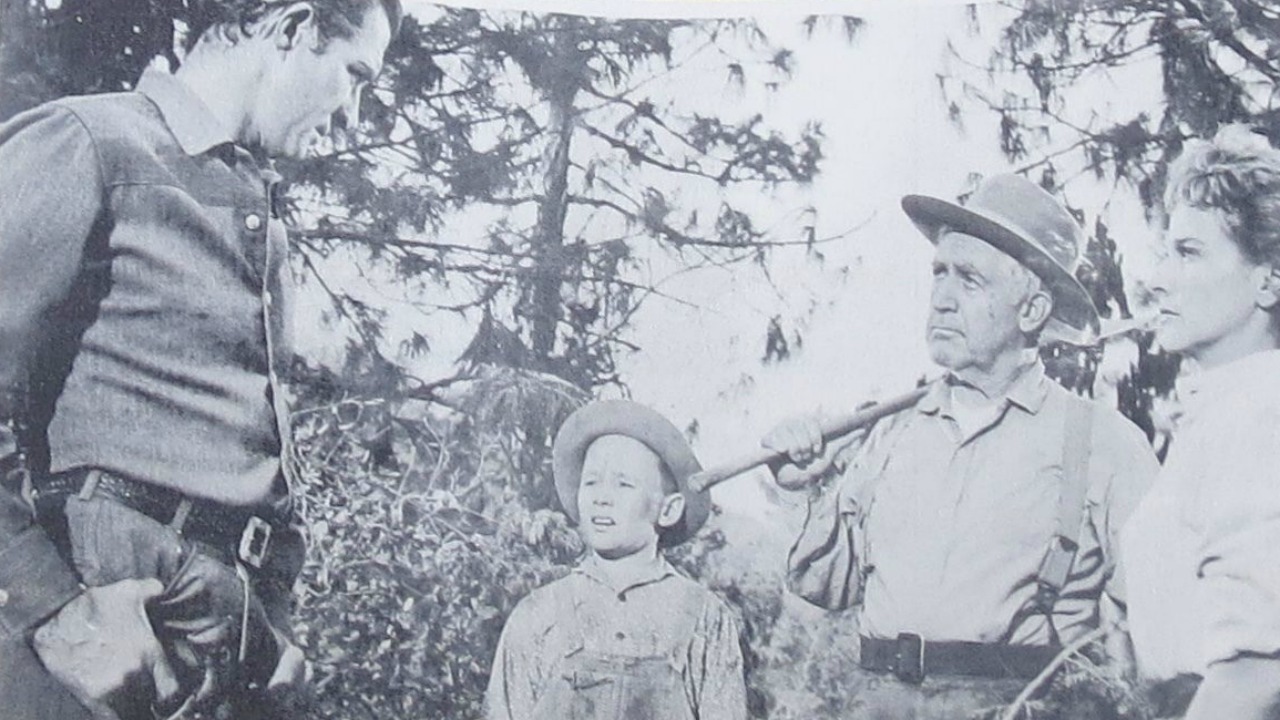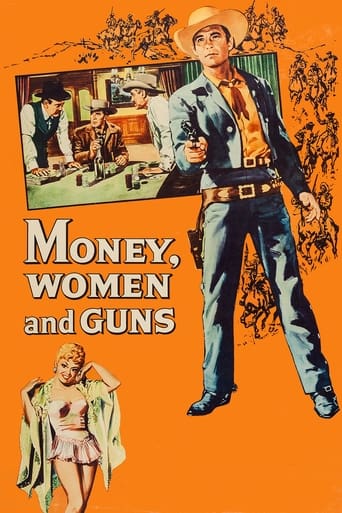

A better than average western programmer with an excellent cast of character actor veterans, including Kim Hunter, Lon Chaney, William Campbell, James Gleason, Phillip Terry, and Don Megowan. Jock Mahoney gives a very natural performance as the lead character. The story and dialogue are also a step above for this type of film, as is the direction. If you think you have the plot figured out after the first 10 minutes of the film, well, keep watching. If you enjoy this type of B-movie western, with more brains than bullets, you'll have fun!
... View More1958's "Money, Women and Guns" was a somewhat modest color B-Western from Universal, where Jock Mahoney was coming off his one science fiction title, "The Land Unknown." Elderly prospector Ben Merriweather (Edwin Jerome) is bushwhacked by a trio of masked marauders, two of which are killed in a brief shootout. In his final moments, the dying man writes out his last will and testament, leaving his wealth to a half dozen beneficiaries, and it's up to Mahoney's frontier detective 'Silver' Ward Hogan to track each one down. One is played by William Campbell, an ex-con struggling to go straight alongside young wife Judi Meredith (both worked for Roger Corman in 1966, Campbell in "Track of the Vampire" and Meredith in "Planet of Blood"). The youngest is David Kingman (Tim Hovey), a little boy whose only contact with Merriweather was a conversation about Santa Claus; his widowed mother (Kim Hunter) takes a shine to the wandering loner that David worships. One self contained vignette teams James Gleason's Henry Devers with Lon Chaney's Art Birdwell; Devers was Merriweather's former prospecting partner, who sends his poker playing partner Birdwell into town to cash his $50,000 beneficiary check. Jeffrey Stone followed up with "The Thing That Couldn't Die," while Phillip Terry did "The Leech Woman" (Tom Drake worked with Chaney in 1956's "The Cyclops" and 1966's "House of the Black Death"). As for Chaney, this innocuous little Western marked his final credit for Universal, the studio that cast him adrift following 1945's "House of Dracula," calling him back on only four occasions, the first three being 1948's "Abbott and Costello Meet Frankenstein," 1951's "Flame of Araby," and 1952's "The Black Castle" (he previously worked for director Richard H. Bartlett in 1955's "The Silver Star," for Lippert Pictures).
... View MoreThe title itself just about sums up Hollywood film production. Kidding aside, this Western's got a number of nice touches, and with a more involved director (Bartlett) and dynamic lead (Mahoney), could have gelled into a genuine sleeper. It's got an unusual mystery premise for a Western— detective Hogan has to figure out which beneficiary killed the wealthy old miner— as well as a cast of former A-players— Chaney, Drake, Evans, Gleason, and Terry. But especially, there's Kim Hunter who only a few years earlier picked up a heavyweight Oscar for A Streetcar Named Desire (1951).I suspect it's a better than the average B-production because of studio (Universal) backing. That backing leads to some scenic locations, fine color photography, and the supporting cast of familiar faces. Also, the unconventional script contains some nice ironies, along with a few surprises. In fact, calling this a pacifist Western may not be too much of a stretch.Mahoney certainly looks the part of a Western hero, but unfortunately more or less walks through his part in a perfectly tailored outfit. Then too, director Bartlett does nothing to draw us further into the story-- as a result, we remain on the outside, looking in. Anyway, it remains a Western of fine visuals with an unusual storyline, despite the two central drawbacks.
... View MoreJock Mahoney, TV's Range Rider, stars in this routine B-western involving gold, pretty gals and greed. Mahoney, who had also doubled for Charles Starrett in the Durango Kid movies, strikes an imposing figure in this routine oater.Kim Hunter and the always reliable Gene Evans turn in decent performances as Jocko tracks down the heirs to a fortune in gold. The budget as well as the writing are barely adequate, but the cast makes the best of a familiar plot. Look also for the great Lon Chaney, Jr. in another post-Wolfman supporting role. Recommended for B-western fans only .....
... View More